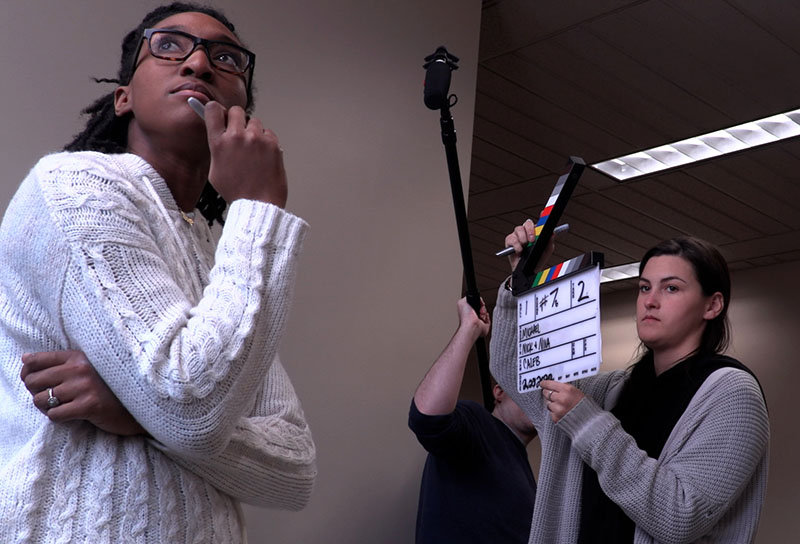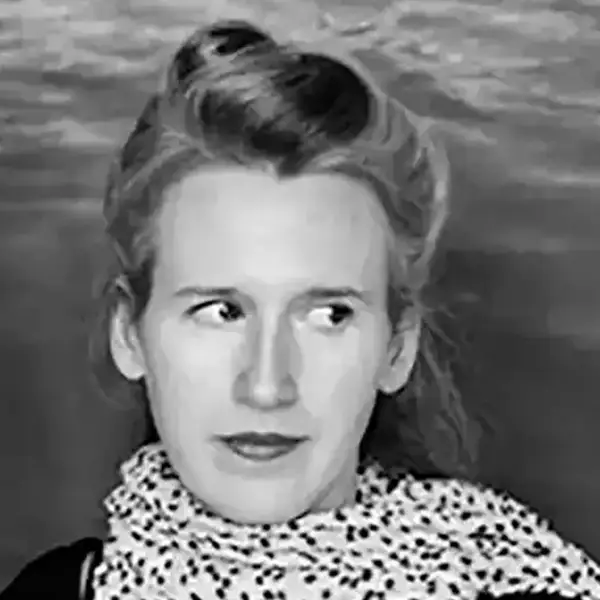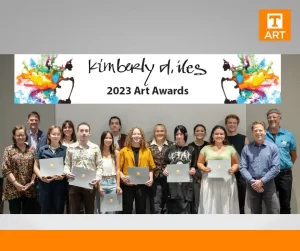Cinema Studies
Tell powerful stories. Refine your critical and technical abilities. Realize your vision.


FRAME YOUR EXPERIENCE
The discipline of Cinema Studies encompasses film, television, and related narrative arts (e.g., video games). The School of Art offers an undergraduate major and minor in Cinema Studies. Students in the program produce their own films, videos, and animations, and study the cultural, historic, and aesthetic dimensions of motion pictures and television. Our Media Pool and facilities — including newly renovated spaces slated to open in January 2025 — equip our students with everything that they need for their next creative project. Graduates of our programs go on to secure successful careers in the film and television industry, top-ranked MFA and PhD programs, and other professional spheres.
Programs in Cinema Studies
Bachelor of Arts
The School of Art offers a Bachelor of Arts degree in cinema studies to students interested in the analysis and creation of moving images. Our curriculum allows students to choose a greater emphasis in cinema history and aesthetics or in production, though they complete coursework in both areas. Our faculty are Pulitzer Prize and Oscar nominees, prizewinners at major film festivals such as Sundance, and awardees of numerous university teaching awards. Undergraduate cinema studies students examine the history and aesthetics of movies while also undertaking their own productions. Explore the options below to learn more about our undergraduate programs.
Degree Requirements
Offered Courses
- ART 102 Non-Major Introduction to Art: Time
- ARTC 401 Experiments in Sequencing
- ARTC 439 Special Topics in Four-Dimensional Arts
- CNST 233 Animation I
- CNST 236 Introduction to Cinema and Video Art
- CNST 281 Introduction to Film Studies
- CNST 306 Shakespeare and Film
- CNST 312 Popular Culture and American Politics
- CNST 314 Food, Fiction, and Film in Modern Japan
- CNST 315 Asian Film
- CNST 320 Middle Eastern Film
- CNST 321 Japanese Graphic Novel/Anime
- CNST 323 German Film Survey
- CNST 325 Russian Film
- CNST 326 Brazilian Cinema
- CNST 333 Animation II
- CNST 334 Film and American Culture
- CNST 365 Writing the Screenplay
- CNST 366 Hollywood and the 20th Century
- CNST 400 Special Topics
- CNST 420 French Cinema
- CNST 422 Topics in Italian Cinema
- CNST 423 Themes and Genres in German Cinema
- CNST 431 The Business of Cinema
- CNST 425 Topics In Non-Fiction Filmmaking
- CNST 433 Animation III
- CNST 435 Narrative Filmmaking
- CNST 436 Video Art
- CNST 433 History of Film and Modern and Contemporary Art
- CNST 434 Film and Visual Culture in the Hispanic World
- CNST 465 Latin American Film and Culture
- CNST 469 Sexuality and Cinema
- CNST 482 Special Topics in Global Cinema
- CNST 489 Special Topics in Film
- CNST 495 Modern China in Film
- CNST 490 Internship
- CNST 491 Foreign Study
- CNST 492 Off-Campus Study
- CNST 493 Independent Study
Minor
The School of Art offers a cinema studies minor for students pursuing other fields of study. Explore the options below to learn more about our minor program.
Minor Requirements
Offered Courses
- ART 102 Non-Major Introduction to Art: Time
- ARTC 401 Experiments in Sequencing
- ARTC 439 Special Topics in Four-Dimensional Arts
- CNST 233 Animation I
- CNST 236 Introduction to Cinema and Video Art
- CNST 281 Introduction to Film Studies
- CNST 306 Shakespeare and Film
- CNST 312 Popular Culture and American Politics
- CNST 314 Food, Fiction, and Film in Modern Japan
- CNST 315 Asian Film
- CNST 320 Middle Eastern Film
- CNST 321 Japanese Graphic Novel/Anime
- CNST 323 German Film Survey
- CNST 325 Russian Film
- CNST 326 Brazilian Cinema
- CNST 333 Animation II
- CNST 334 Film and American Culture
- CNST 365 Writing the Screenplay
- CNST 366 Hollywood and the 20th Century
- CNST 400 Special Topics
- CNST 420 French Cinema
- CNST 422 Topics in Italian Cinema
- CNST 423 Themes and Genres in German Cinema
- CNST 431 The Business of Cinema
- CNST 425 Topics In Non-Fiction Filmmaking
- CNST 433 Animation III
- CNST 435 Narrative Filmmaking
- CNST 436 Video Art
- CNST 433 History of Film and Modern and Contemporary Art
- CNST 434 Film and Visual Culture in the Hispanic World
- CNST 465 Latin American Film and Culture
- CNST 469 Sexuality and Cinema
- CNST 482 Special Topics in Global Cinema
- CNST 489 Special Topics in Film
- CNST 495 Modern China in Film
- CNST 490 Internship
- CNST 491 Foreign Study
- CNST 492 Off-Campus Study
- CNST 493 Independent Study
Non-Major Electives
The School of Art offers courses in cinema studies for non-art majors. Explore the option below to learn more about our non-major electives.
Offered Courses
- ARTN 102 Non-Major Introduction to Art: Time
- ARTN 233 Non-Major Animation
- ARTN 239 Non-Major Intro to Special Topics in Four-Dimensional
Faculty



Heather Coker Hawkins
Assistant Professor
Area of Study: Cinema Studies + Time-Based Art

Paul Harrill
Co-Chair, Cinema Studies, Professor and Dee & Jimmy Haslam Chair in Cinema Studies
Area of Study: Cinema Studies + Time-Based Art



John Kelley
Associate Professor
Area of Study: Cinema Studies + Time-Based Art












Janelle VanderKelen
Assistant Professor
Area of Study: Cinema Studies + Time-Based Art
Cinema Studies News
- Kimberly D. Iles Scholarship Awards – 2023

- Cinema Studies Alumni Ben Murphy Receives Alumni Promise Award

- Elaine Sheldon’s “King Coal” a New York Times Critics Pick

- BFA Graduate Chloe Baker Begins Art Career in Knoxville

- Elaine McMillion Sheldon to Direct Narrative Feature Film on Mother Jones

- Handheld – Cinema Studies Student Screening – Spring 2023

Resources
Articles
Knoxville Film Resources
Internships and Workshops
Professional Organizations + Internships increasingly play a vital role in a students’ professional preparation during college. Their importance in helping a student secure work after college cannot be overstated. This is especially true in the world of film and video. Students in cinema studies programs are strongly encouraged to pursue internships in Knoxville, which has a thriving production community, and beyond. Please enroll in the Canvas site to read more about securing credit for Cinema Studies and Time-Based Arts internships at UT.